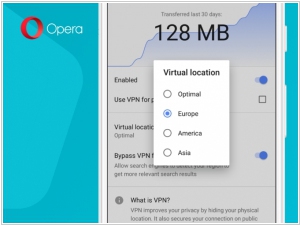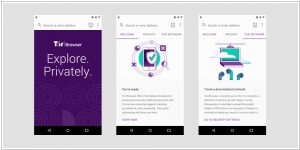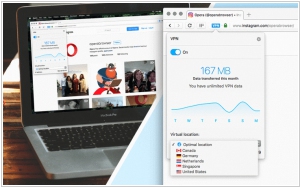Browsers with VPN
Updated: August 01, 2023
Browsers with VPN (Virtual Private Network) integration are web browsers that include built-in VPN functionality to enhance user privacy and security while browsing the internet. These browsers enable users to establish encrypted connections through a VPN service, effectively masking their IP addresses and location, thus protecting their online activities from potential snoopers or data trackers. Browsers with VPN offer an added layer of protection, particularly when accessing public Wi-Fi networks, where the risk of data interception is higher. With the convenience of having VPN capabilities within the browser, users can easily activate and deactivate VPN connections, making it a user-friendly solution for safeguarding online privacy and ensuring a more secure browsing experience.
See also: Top 10 Web Browsers
See also: Top 10 Web Browsers
2019. Opera for Android added built-in VPN

In 2016, Opera introduced a free VPN app for Android, which was later discontinued. However, Opera is now bringing back the free VPN service as part of its Opera browser for Android. The feature is currently in the testing phase and is gradually being rolled out to Opera beta users. Once activated, users can select their desired virtual location, although the options may not be as extensive as those offered by commercial VPN services. Users can choose to appear virtually located in Europe, America, or Asia. Opera assures users that it does not retain any usage logs. Additionally, Opera already provides a free and unlimited VPN within its desktop web browser. Similarly, the mobile browser allows users to bypass the VPN when accessing search engines.
2018. Tor Browser comes to Android

The Tor browser, known for its anonymity features, has now been officially launched for Android users. However, in order to use the app, users will also need to download the Tor Project proxy app called Orbot. Tor Project's browser ensures anonymity by employing a decentralized network of relays that bounce a user's data, effectively anonymizing their internet activity. As a result, it becomes exceedingly difficult for advertisements, location trackers, and even government surveillance to track an individual's online movements. Following the introduction of the Tor browser for Android, Orfox, a long-standing Tor Project-approved browsing app, has announced its plan to phase out by 2019.
2016. Opera browser with a built-in VPN became available to all

Opera has achieved a significant milestone by becoming the first browser developer to integrate an unlimited VPN service directly into its mainstream desktop internet browser. With the release of Opera 40, all users of the desktop browser can now enjoy the privacy and security advantages offered by a VPN. The built-in VPN in Opera for desktop is noteworthy because it provides unlimited usage without any time restrictions, unlike services like TunnelBear. However, there is one limitation: it only offers five different locations, whereas standalone VPN services typically provide locations in numerous countries worldwide. Another noteworthy feature introduced in Opera 40 is support for Google's Chromecast streaming dongle. This addition may attract users who were hesitant to switch from Chrome to Opera.
2016. Opera adds built-in free VPN service

The Opera browser is introducing a free built-in VPN service in its early release developer version. With this integrated VPN, your unencrypted browser session is safeguarded against exposure on public WiFi networks, and it allows you to bypass occasional firewalls. Additionally, it assigns you a virtual IP address, making it more challenging to track your location. At present, you have the option to select from three virtual locations (USA, Canada, and Germany). However, the company plans to add more locations once this feature is included in the stable release channel later this year.
2015. Opera browser gets password sync, VPN-protection

Earlier this year, Opera acquired SurfEasy, a virtual private networking (VPN) service that enhances user privacy and ensures secure browsing. Now, Opera has integrated this technology into its Windows, Mac, and Linux versions. Currently, the integration is relatively basic. When you open a private tab in Opera 32, the browser will display a link to download SurfEasy. However, it is highly likely that the company is actively working on creating a more seamless integration between its tools and SurfEasy. Additionally, Opera Max, the compression-focused proxy service for Android, appears to be a natural fit for integrating with SurfEasy. This version also introduces improved syncing options, including the ability to synchronize passwords alongside bookmarks, tabs, and other browser data. Furthermore, users now have the option to view their bookmarks in a tree view, facilitating easier organization for those with extensive bookmark collections.

